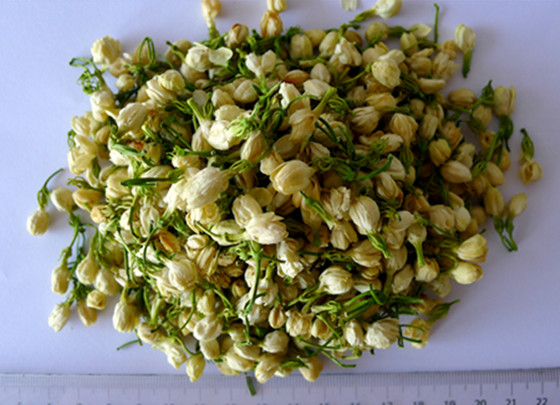Jasmine Flower

Widely cultivated for its flowers, jasmine is enjoyed in the garden, as a house plant, and as cut flowers. The flowers are worn by women in their hair in southern and southeast Asia. The delicate jasmine flower opens only at night and may be plucked in the morning when the tiny petals are tightly closed, then stored in a cool place until night. The petals begin to open between six and eight in the evening, as the temperature lowers.
Jasmine tea
Jasmine tea is consumed in China, where it is called jasmine-flower tea (茉莉花茶; pinyin: mò lì huā chá). Jasminum sambac flowers are also used to make jasmine tea, which often has a base of green tea or white tea, but sometimes an Oolong base is used. Flowers and tea are "mated"[clarification needed] in machines that control temperature and humidity. It takes four hours or so for the tea to absorb the fragrance and flavour of the jasmine blossoms, and for the highest grades, this process may be repeated as many as seven times. It must be refired to prevent spoilage. The spent flowers may or may not be removed from the final product, as the flowers are completely dry and contain no aroma. Giant fans are used to blow away and remove the petals from the denser tea leaves.
In Okinawa, Japan, jasmine tea is known as sanpin cha (さんぴん茶).
Jasmine syrup
Jasmine syrup, made from jasmine flowers, is used as a flavouring agent.
Jasmine essential oil
Jasmine is considered an absolute and not an essential oil as the petals of the flower are much too delicate and would be destroyed by the distillation process used in creating essential oils. Other than the processing method it is essentially the same as an essential oil. Absolute is a technical term used to denote the process of extraction. It is in common use. Its flowers are either extracted by the labour-intensive method of enfleurage or through chemical extraction. It is expensive due to the large number of flowers needed to produce a small amount of oil. The flowers have to be gathered at night because the odour of jasmine is more powerful after dark. The flowers are laid out on cotton cloths soaked in olive oil for several days and then extracted leaving the true jasmine essence. Some of the countries producing jasmine essential oil are India, Egypt, China and Morocco.
Jasmine absolute used in perfume and incense
Many species also yield an absolute, which is used in perfumes and incense. Its chemical constituents include methyl anthranilate, indole, benzyl alcohol, linalool, and skatole.
Medical
Jasmine scent and (R)-(–)-linalool (licareol), one of its major odor components, has been reported to have sedative properties now being investigated for medical applications.